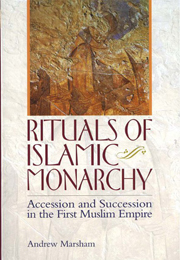Book contents
- Frontmatter
- Contents
- List of maps and figures
- Acknowledgements
- Map 1
- Map 2
- Map 3
- INTRODUCTION
- PART I LATE ANTIQUE ARABIA AND EARLY ISLAM (c. 550–c. 660)
- PART II THE UMAYYAD CALIPHATE (c. 660–750)
- PART III THE EARLY ABBASID CALIPHATE (c. 750–809)
- INTRODUCTION
- 10 THE CONSOLIDATION OF ABBASID POWER: AL-MANṢŪR AND AL-MAHDĪ (754–785)
- 11 THE CALIPHATES OF MŪSĀ AL-HĀDĪ (785–786) AND HĀRŪN AL-RASHĪD (786–809)
- 12 ‘DISPOSITIVE DOCUMENTS’ FOR THE EARLY ABBASID SUCCESSION
- PART IV THE MIDDLE ABBASID CALIPHATE (809–865)
- CONCLUSION
- Genealogical table of Quraysh
- Genealogical table of the Abbasid caliphs
- Bibliography
- Index
10 - THE CONSOLIDATION OF ABBASID POWER: AL-MANṢŪR AND AL-MAHDĪ (754–785)
from PART III - THE EARLY ABBASID CALIPHATE (c. 750–809)
Published online by Cambridge University Press: 05 September 2013
- Frontmatter
- Contents
- List of maps and figures
- Acknowledgements
- Map 1
- Map 2
- Map 3
- INTRODUCTION
- PART I LATE ANTIQUE ARABIA AND EARLY ISLAM (c. 550–c. 660)
- PART II THE UMAYYAD CALIPHATE (c. 660–750)
- PART III THE EARLY ABBASID CALIPHATE (c. 750–809)
- INTRODUCTION
- 10 THE CONSOLIDATION OF ABBASID POWER: AL-MANṢŪR AND AL-MAHDĪ (754–785)
- 11 THE CALIPHATES OF MŪSĀ AL-HĀDĪ (785–786) AND HĀRŪN AL-RASHĪD (786–809)
- 12 ‘DISPOSITIVE DOCUMENTS’ FOR THE EARLY ABBASID SUCCESSION
- PART IV THE MIDDLE ABBASID CALIPHATE (809–865)
- CONCLUSION
- Genealogical table of Quraysh
- Genealogical table of the Abbasid caliphs
- Bibliography
- Index
Summary
Al-Manṣūr ruled for just over twenty-one years, from about 10 June 754 until about 7 October 775. For much of his reign, his authority was far from secure. Continued upheaval across the caliphate appears to reflect the dislocation caused by the revolution and its aftermath: there were rebellions in the name of descendants of the Prophet in Medina and Basra in the autumn of 762, and syncretist revolts, rooted in pre-Islamic Iranian religion, broke out in Khurasan, such as those led by Sunbādh (755) and Ustādhsīs (767). The Abbasid army itself was also prone to unruly millenarian and messianic fervour, and so the ceremonial of al-Manṣūr's reign was directed not only at legitimating a dynasty that had just seized power, but also at containing and directing religious enthusiasm among the troops who had installed it.
Al-Manṣūr also faced the problem of rivalry within the Abbasid family: his accession was challenged by his paternal uncle cAbd Allāh b. cAlī, whom he defeated and imprisoned in 754–5 and killed in 764. This was a military turning-point in al-Manṣūr's promotion of a ‘Manṣūrid’ claim to the caliphate, to the exclusion of other branches of the Abbasid family, notably those of his paternal uncles. The political battle lasted much longer, and was fought against al-Manṣūr's nephew cĪsā b. Mūsā b. Muḥammad b. cAlī, who had widely recognised claims to the succession after al-Manṣūr.
If the ambitions of al-Manṣūr for his son Muḥammad al-Mahdī (and thus also the ambitions of those whose fortunes were tied to this ‘Manṣūrid’ branch of the dynasty) were to be fulfilled, cĪsā b. Mūsā had to be replaced by Muḥammad al-Mahdī.
- Type
- Chapter
- Information
- Rituals of Islamic MonarchyAccession and Succession in the First Muslim Empire, pp. 192 - 215Publisher: Edinburgh University PressPrint publication year: 2009



